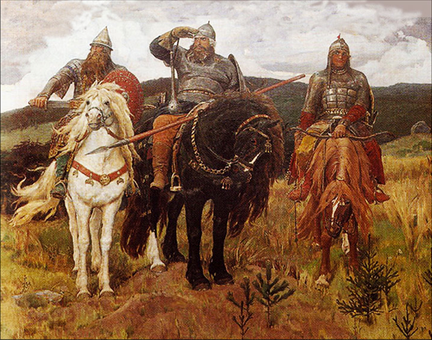

Three Russian knights, Boris, Ivan and Peter, wanted to get Arabian horses. And a Turkish pasha*, Mustapha, wanted to sell three of his Arabian horses for only 300 rubles. One of the horses was white as snow, the other was black as a raven, and the third was piebald.** An Arab merchant Selim agreed to supervise the sale.
Selim first met with Boris, showed him the horses, and said, "All three
are superb, and the price of 300 rubles for all three is very low, but
they are different. Could you help me to assign a fair price to each of
them?"
Boris obliged and said, "The white horse is exquisite and is worth130
rubles. The black one is beautiful and is worth 110 rubles. But the
piebald horse is weird, so it is worth only 60 rubles.
Later Selim met with Ivan and repeated his request. Ivan obliged and priced the horses as follows: Both black and white horses are worth 120 rubles each, and the piebald horse is worth only 60 rubles.
Finally Selim talked to Peter, who was rather brusque and said, "All three horses seem adequate for a knight. Sell each one for 100 rubles."
Then Selim went back to Boris and said, "I have a bargain for you. You may have the white horse for only 120 rubles." And Boris happily paid this price.
Later Selim offered the black horse for only 110 rubles to Ivan, who was eager to accept such a good deal.
Peter seemed to be reluctant when he saw a piebald horse. But when he learned that it would cost him only 90 rubles, he accepted the deal.
So Selim paid Mustapha his 300 rubles and pocketed the remaining 20.
_____________________________________________________________________________________________________________
How was it possible that Mustapha got what he wanted, each knight paid 10 rubles fewer than he expected, and Selim still made a profit?
*pasha (noun): a man of high rank or office (as in Turkey or northern Africa)
**pibald (adjective): (of a horse) having irregular patches of two colors, typically black and white.